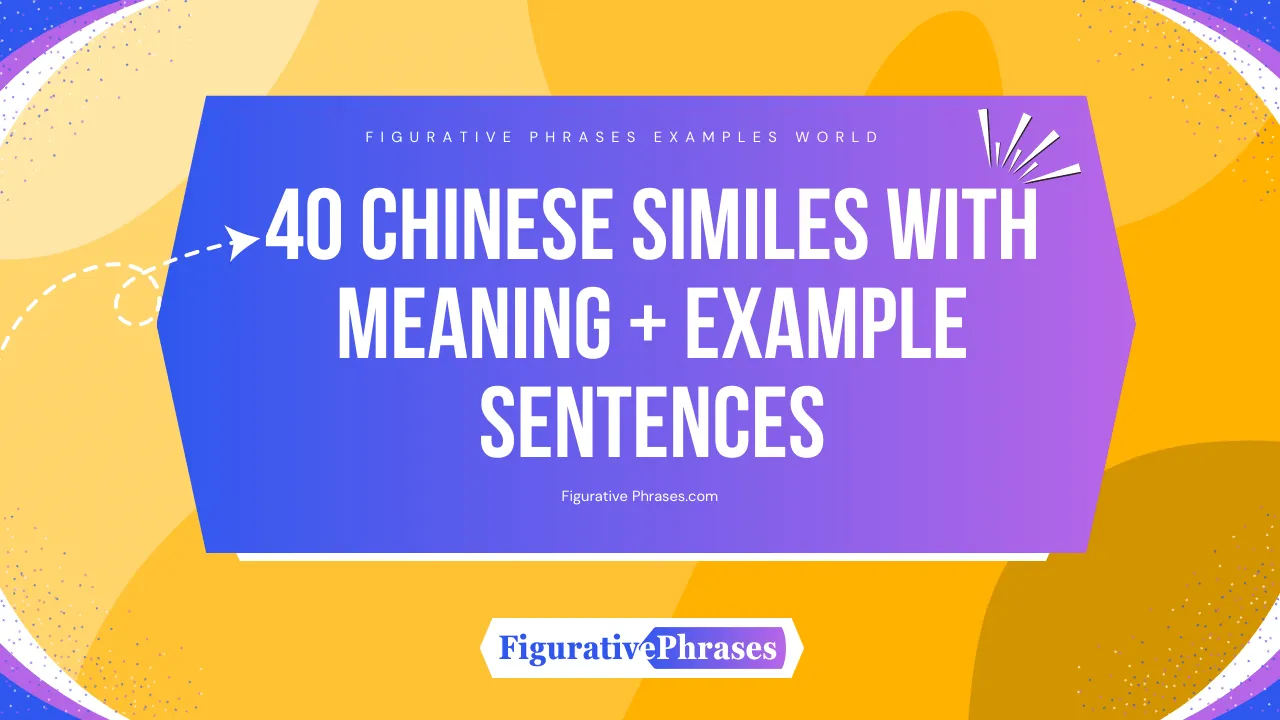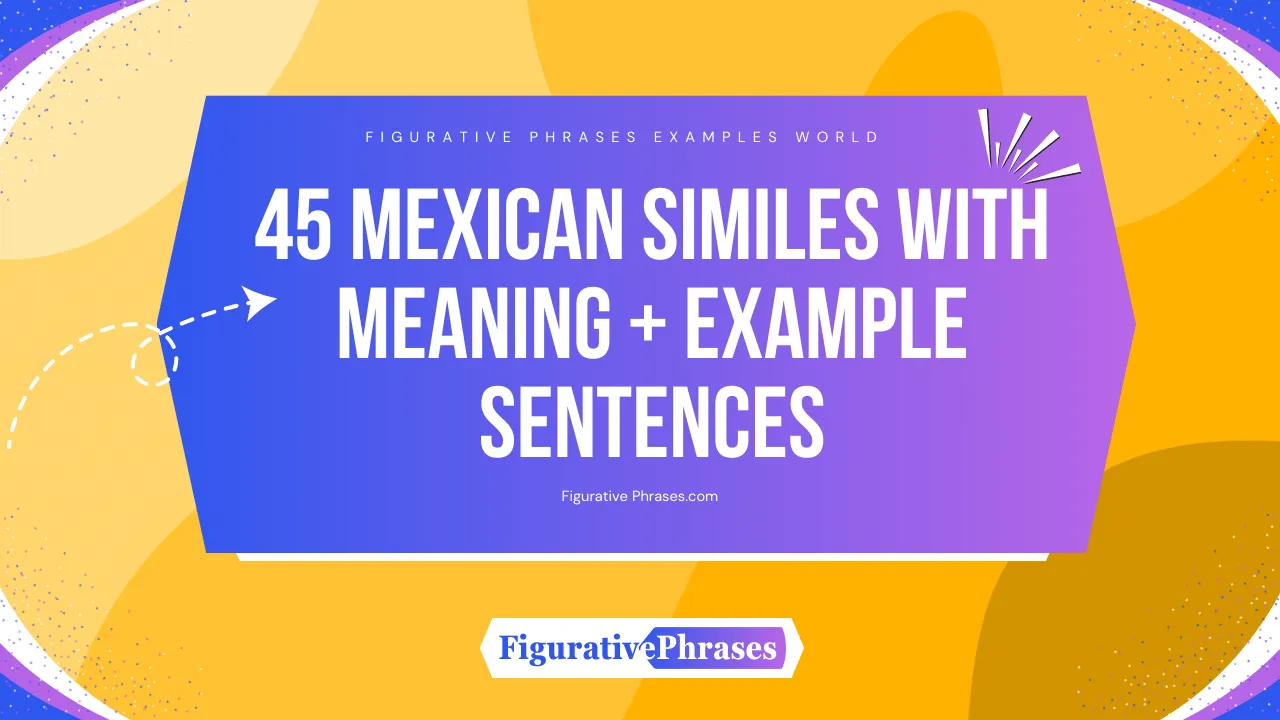
I wrote this guide to give you clear, ready-to-use similes. First, I show what a simile is and how it’s different from a metaphor. Then I share 90+ examples—common and uncommon, long and short—with simple meanings and lines from books and poems. I also pull similes from films, novels, and plays, and make quick sets for teachers, students, kids, and adults. To help you write fast, I group everything by themes like nature, emotions, food, sports, body parts, colors, life, and death. You can skim any section, pick a line that fits your idea, and use it right away.
What is a Simile?
A simile is a direct comparison that uses “like” or “as” to make meaning clear. It paints a quick picture so the reader understands fast.
A simple definition helps us use similes with purpose; next we separate similes from metaphors.
Simile vs Metaphor — What’s Difference?
A simile compares with “like/as”; a metaphor says one thing is another.
Simile: “eyes like stars.” Metaphor: “eyes are stars.” Similes feel explicit; metaphors feel fused.
Now that the line is clear, here’s where similes sit among other figures of speech.
How many more figures of speech like similes?
Other common figures include metaphor, personification, hyperbole, idiom, irony, oxymoron, pun, litotes, onomatopoeia, alliteration, assonance, allusion, and symbolism.
Each one changes sound or sense in a different way, but simile stays the cleanest “like/as” tool.
With the toolkit set, let’s start with the most common similes you’ll actually use.
What are the Most Common Similes Examples?
The most common similes rely on clear, concrete images and simple “like/as” links.
They show feeling fast and work in everyday writing or speech.
- “I wandered lonely as a cloud.”
Meaning: Solitude feels light and drifting.
Source: William Wordsworth, “I Wandered Lonely as a Cloud,” Poems in Two Volumes (1807). - “O my Luve’s like a red, red rose.”
Meaning: Love feels fresh, vivid, and blooming.
Source: Robert Burns, “A Red, Red Rose” (1794). - “Like a rich jewel in an Ethiope’s ear.”
Meaning: Beauty glows against darkness.
Source: William Shakespeare, Romeo and Juliet (c. 1595), I.v. - “Though your sins be as scarlet… they shall be as white as snow.”
Meaning: Forgiveness cleans completely.
Source: The Book of Isaiah 1:18. - “Like a thunderbolt he falls.”
Meaning: A sudden, forceful plunge.
Source: Alfred, Lord Tennyson, “The Eagle” (1851).

Clear images build trust; now try fresher turns that surprise the ear.
What are the Uncommon Similes Examples?
Uncommon similes bend the image or context so the line feels new.
They still use “like/as,” but the picture is unexpected.
- “When the evening is spread out against the sky / Like a patient etherized upon a table.”
Meaning: Dazed stillness replaces romance.
Source: T. S. Eliot, “The Love Song of J. Alfred Prufrock” (1915). - “Does it dry up like a raisin in the sun?”
Meaning: A delayed dream shrivels.
Source: Langston Hughes, “Harlem” (1951). - “I saw my life branching out before me like the green fig tree.”
Meaning: Many choices can freeze action.
Source: Sylvia Plath, The Bell Jar (1963). - “—There she blows!… A hump like a snow-hill!”
Meaning: Vast, pale mass looming at sea.
Source: Herman Melville, Moby-Dick (1851). - “As kingfishers catch fire…”
Meaning: Bright motion flashes into view.
Source: Gerard Manley Hopkins, “As Kingfishers Catch Fire” (written 1877; pub. 1918).
To deepen range and rhythm, long “epic” similes carry a whole scene inside them.
What are the long similes examples?
Long similes (often “epic similes”) extend the picture across several beats.
They slow time, add texture, and invite reflection.
- “As when a smith dips a glowing axe in water, hisses loud…”
Meaning: Blinding the Cyclops shocks and steams.
Source: Homer, Odyssey 9 (transl. various). - “As when the West Wind tosses the sea, waves rise…”
Meaning: Battle surges like stormed water.
Source: Homer, Iliad (epic simile recurring). - “Like bees in early summer in the meadows…”
Meaning: People swarm and labor as a hive.
Source: Virgil, Aeneid 1 (transl. various). - “As doves called by desire… glide to their sweet nest.”
Meaning: The damned drift helplessly, soft yet doomed.
Source: Dante Alighieri, Inferno V (1320). - “In bulk as huge as whom the fables name Leviathan…”
Meaning: Satan’s size exceeds human measure.
Source: John Milton, Paradise Lost I (1667).
Short bursts, by contrast, punch quick and clean.
What are the short similes examples?
Short similes deliver one sharp snap of sense.
They work best when you need speed and clarity.
- “Like as the waves make toward the pebbled shore.”
Meaning: Time presses forward without pause.
Source: William Shakespeare, Sonnet 60 (1609). - “He is brought as a lamb to the slaughter.”
Meaning: Silent, helpless surrender.
Source: The Book of Isaiah 53:7. - “And sometimes like a gleaner thou dost keep / Steady thy laden head.”
Meaning: Autumn moves slow and full.
Source: John Keats, “To Autumn” (1820). - “My mistress’ eyes are nothing like the sun.”
Meaning: Honest love rejects false praise.
Source: William Shakespeare, Sonnet 130 (1609). - “Swift as a shadow, short as any dream.”
Meaning: Love’s change is quick and brief.
Source: William Shakespeare, A Midsummer Night’s Dream I.i.
After form and length, it helps to see similes across the wider world of literature.
What are the similes examples in Literature?
In prose, similes anchor feelings to physical things.
They help scenes snap into focus.
- “By nightfall [the ladies] were like soft teacakes with frostings of sweat and sweet talcum.”
Meaning: Heat and ritual make the town drowsy.
Source: Harper Lee, To Kill a Mockingbird (1960). - “It was as dark as a wolf’s mouth.”
Meaning: The night feels animal-black and close.
Source: Mark Twain, Adventures of Huckleberry Finn (1884). - “Lennie… snorted into the water like a horse.”
Meaning: His size and habit feel creature-strong.
Source: John Steinbeck, Of Mice and Men (1937). - “The curtains… ballooned… like pale flags.”
Meaning: Air turns the room into a soft parade.
Source: F. Scott Fitzgerald, The Great Gatsby (1925)
Seeing how poems handle similes will sharpen tone and music in your lines.
What are the similes examples in Poem?
Individual poems often carry one striking simile that shapes the whole mood.
These lines are short to quote and easy to teach.
- “As idle as a painted ship / Upon a painted ocean.”
Meaning: Stillness becomes unnatural and eerie.
Source: Samuel Taylor Coleridge, “The Rime of the Ancient Mariner” (1798). - “Bent double, like old beggars under sacks.”
Meaning: War crushes youth into age.
Source: Wilfred Owen, “Dulce et Decorum Est” (1917). - “On the morrow he will leave me, as my hopes have flown before.”
Meaning: Loss repeats itself.
Source: Edgar Allan Poe, “The Raven” (1845). - “Our two souls… Like gold to airy thinness beat.”
Meaning: Love stretches without breaking.
Source: John Donne, “A Valediction: Forbidding Mourning” (1633). - “Like a long-legged fly upon the stream.”
Meaning: Thought rests light and poised.
Source: W. B. Yeats, “Long-Legged Fly” (1939).

Broaden to “poetry” at large and you’ll catch modern voices and themes.
What are the similes examples in Poetry?
Across eras, poets lean on similes to carry emotion fast.
These keep the wording plain but the images strong.
- “But still, like dust, I’ll rise.”
Meaning: Hope lifts no matter the weight.
Source: Maya Angelou, “Still I Rise” (1978). - “Does it dry up like a raisin in the sun?”
Meaning: Desire starves when delayed.
Source: Langston Hughes, “Harlem” (1951). - “As kingfishers catch fire…”
Meaning: Bright movement flashes meaning.
Source: Gerard Manley Hopkins, “As Kingfishers Catch Fire” (1918). - “The evening… like a patient etherized upon a table.”
Meaning: Modern life numbs the senses.
Source: T. S. Eliot, “Prufrock” (1915). - “Like a gleaner thou dost keep / Steady thy laden head.”
Meaning: Ripeness carries quiet burden.
Source: John Keats, “To Autumn” (1820).
Film dialogue also uses similes because they land quickly with listeners.
What are the similes examples in Films?
Movies love similes because one crisp image fits any screen.
These lines travel well into everyday talk.
- “Life is like a box of chocolates.”
Meaning: Outcomes are mixed and unknown.
Source: Forrest Gump (1994), written by Eric Roth. - “Ogres are like onions.”
Meaning: People have layers.
Source: Shrek (2001), written by Ted Elliott & Terry Rossio et al. - “I’m like a dog chasing cars.”
Meaning: Chaotic impulse without plan.
Source: The Dark Knight (2008), written by Jonathan & Christopher Nolan. - “All those moments will be lost in time, like tears in rain.”
Meaning: Memory dissolves and can’t be held.
Source: Blade Runner (1982), monologue by Rutger Hauer (improvised; based on script by David Peoples & Hampton Fancher). - “You’re like a crazy little brother.”
Meaning: Affection mixed with exasperation.
Source: Guardians of the Galaxy Vol. 2 (2017), written by James Gunn.
Prose fiction gives even more flexible room for lived, tactile comparisons.
What are the similes examples in Books?
Novels and essays use similes to make scenes feel physical and near.
They can be domestic, comic, or stark.
- “By nightfall [the ladies] were like soft teacakes with frostings of sweat and sweet talcum.”
Meaning: Heat and habit shape the town’s rhythm.
Source: Harper Lee, To Kill a Mockingbird (1960). - “It was as dark as a wolf’s mouth.”
Meaning: Thick, animal darkness.
Source: Mark Twain, Adventures of Huckleberry Finn (1884). - “[Lennie]… snorted into the water like a horse.”
Meaning: His strength is unrefined and animal.
Source: John Steinbeck, Of Mice and Men (1937). - “The curtains… ballooned… like pale flags.”
Meaning: Air gives the room a light, floating life.
Source: F. Scott Fitzgerald, The Great Gatsby (1925)
Stage writing pushes similes into speech where they cut fast and clean.
What are the similes examples in Drama?
Plays use similes for speed: one image, one hit, one choice.
They show character and turn the scene’s mood.
- “Pity, like a naked new-born babe, / Striding the blast.”
Meaning: Mercy is powerful and urgent.
Source: William Shakespeare, Macbeth I.vii. - “She hangs upon the cheek of night / Like a rich jewel.”
Meaning: Bright beauty set in dark.
Source: William Shakespeare, Romeo and Juliet I.v. - “I tell you, I want magic!… He acts like an animal.”
Meaning: Desire and disgust collide.
Source: Tennessee Williams, A Streetcar Named Desire (1947). - “I am like one of those… who, being crossed in love, fall into melancholy.”
Meaning: Love’s wound triggers gloom.
Source: William Shakespeare, As You Like It III.ii. - “Like the base Indian, threw a pearl away.”
Meaning: Othello wastes what he can’t value.
Source: William Shakespeare, Othello V.ii.
From forms and genres, let’s pivot to audiences and themes in the next sections.
What are the similes examples for Teachers?
Use high-image, short lines that students can quote and explain.
Pick clear scenes and everyday nouns.
- “Bent double, like old beggars under sacks.” — war crushes youth. (Owen, “Dulce et Decorum Est,” 1917.)
- “Life is like a box of chocolates.” — uncertainty made simple. (Roth, Forrest Gump, 1994.)
- “My mistress’ eyes are nothing like the sun.” — honest love. (Shakespeare, Sonnet 130, 1609.)
- “As idle as a painted ship…” — eerie stillness. (Coleridge, 1798.)
- “Her absence is like the sky…” — total grief. (C. S. Lewis, 1961.)
These teach well; now here are student-friendly picks to analyze and imitate.
What are the similes examples for Students?
Choose lines with plain objects so analysis stays concrete.
- “Like a raisin in the sun.” — withering delay. (Hughes, 1951.)
- “Like pale flags.” — movement and mood. (Fitzgerald, 1925.)
- “Like a gleaner…” — harvest weight. (Keats, 1820.)
- “Like a dog chasing cars.” — motive without plan. (Nolan, 2008.)
- “Like a thunderbolt…” — sudden force. (Tennyson, 1851.)
Next, we’ll switch to theme buckets that writers search for most.
What are the similes examples about nature?
Nature similes tie feeling to land, sea, and sky.
They bring breath, weather, and season into the line.
- “I wandered lonely as a cloud.” — solitude as drift. (Wordsworth, 1807.)
- “Like bees in early summer.” — bustling order. (Virgil, Aeneid 1.)
- “As the West Wind tosses the sea.” — chaotic motion. (Homer, Iliad.)
- “Like a gleaner thou dost keep / Steady thy laden head.” — autumn weight. (Keats, 1820.)
- “Like a thunderbolt he falls.” — hawk as storm. (Tennyson, 1851.)
Emotions come next because similes make feelings visible in one move.
What are the similes examples about emotions?
Emotion similes map inner states to strong images. These similes about emotions make feelings graspable and brief.
- “O my Luve’s like a red, red rose.” — love as bloom. (Burns, 1794.)
- “Her absence is like the sky, spread over everything.” — grief as air. (C. S. Lewis, 1961.)
- “But still, like dust, I’ll rise.” — resilience as lift. (Angelou, 1978.)
- “Does it dry up like a raisin in the sun?” — hope as shrinkage. (Hughes, 1951.)
- “Like as the waves make toward the pebbled shore.” — time’s push as tide. (Shakespeare, Sonnet 60, 1609.)
Food imagery is handy, so let’s plate five lines that taste vivid and clear.
What are the similes examples about food?
Food similes use taste and texture to ground meaning.
They are familiar and strong.
- “Sweeter also than honey.” — joy as sweetness. (Psalms 19:10.)
- “Words… like honey.” — speech as sweet flow. (Homeric usage across epics; e.g., Iliad.)
- “Life is like a box of chocolates.” — outcomes as mix. (Roth, Forrest Gump, 1994.)
- “A hump like a snow-hill!” — whale’s back as piled sweet/solid mass. (Melville, 1851.)
Sports call for motion; these choices run, plunge, and strike.
What are the similes examples about sports?
Sports similes frame speed, power, and impact.
They turn movement into one tight picture.
- “Like a thunderbolt he falls.” — explosive finish. (Tennyson, 1851.)
- “Swift as a shadow.” — rapid change. (Shakespeare, MND, I.i.)
- “Like the waves… toward the pebbled shore.” — relentless pace. (Shakespeare, Sonnet 60.)
- “I’m like a dog chasing cars.” — frantic chase. (Nolan, 2008.)
- “Like bees in early summer.” — team as hive. (Virgil, Aeneid 1.)

Body imagery makes comparisons feel close to the skin.
What are the similes examples about body parts?
Body-based similes hit fast because we feel them at once.
- “Thy hair is as a flock of goats.” — flowing, dark waves. (Song of Songs 4:1.)
- “Thy teeth are like a flock of shorn ewes.” — even, white rows. (Song of Songs 4:2.)
- “My mistress’ eyes are nothing like the sun.” — honest vision. (Shakespeare, Sonnet 130.)
- “Pity, like a naked new-born babe.” — human softness. (Shakespeare, Macbeth I.vii.)
- “[Lennie]… snorted… like a horse.” — brute strength. (Steinbeck, 1937.)
Color similes fix tone with one swatch.
What are the similes examples about colors?
Color similes set mood instantly.
They are plain and memorable.
- “As white as snow.” — pure, clean. (Isaiah 1:18.)
- “Lips red as blood, skin white as snow, hair black as ebony.” — stark contrasts.
Source: Brothers Grimm, “Snow White” (1812). - “It was as dark as a wolf’s mouth.” — deep black. (Twain, 1884.)
- “[Evening]… like a patient etherized…” — sickly pallor. (Eliot, 1915.)
Finally, life and death: two themes where simile often carries the weight.
What are the similes examples about life?
Life similes explain pace, choice, and path in one image.
- “Life is like a box of chocolates.” — mixed outcomes. (Roth, 1994.)
- “Life is too much like a pathless wood.” — maze without map. (Robert Frost, “Birches,” 1916.)
- “I saw my life… like the green fig tree.” — choice paralysis. (Plath, 1963.)
- “Swift as a shadow.” — brief, changing span. (Shakespeare, MND I.i.)
- “Like waves… toward the pebbled shore.” — steady march of time. (Shakespeare, Sonnet 60.)
What are the similes examples about death?
Death similes make loss visible and close.
- “Death lies on her like an untimely frost.”
Meaning: Cold, sudden stillness.
Source: William Shakespeare, Romeo and Juliet IV.v. - “He is brought as a lamb to the slaughter.”
Meaning: Quiet surrender to fate.
Source: Isaiah 53:7. - “All those moments… like tears in rain.”
Meaning: Memory dissolves.
Source: Blade Runner (1982). - “When the evening is… like a patient etherized…”
Meaning: A living death of numbness.
Source: T. S. Eliot, “Prufrock” (1915).






0 Comments